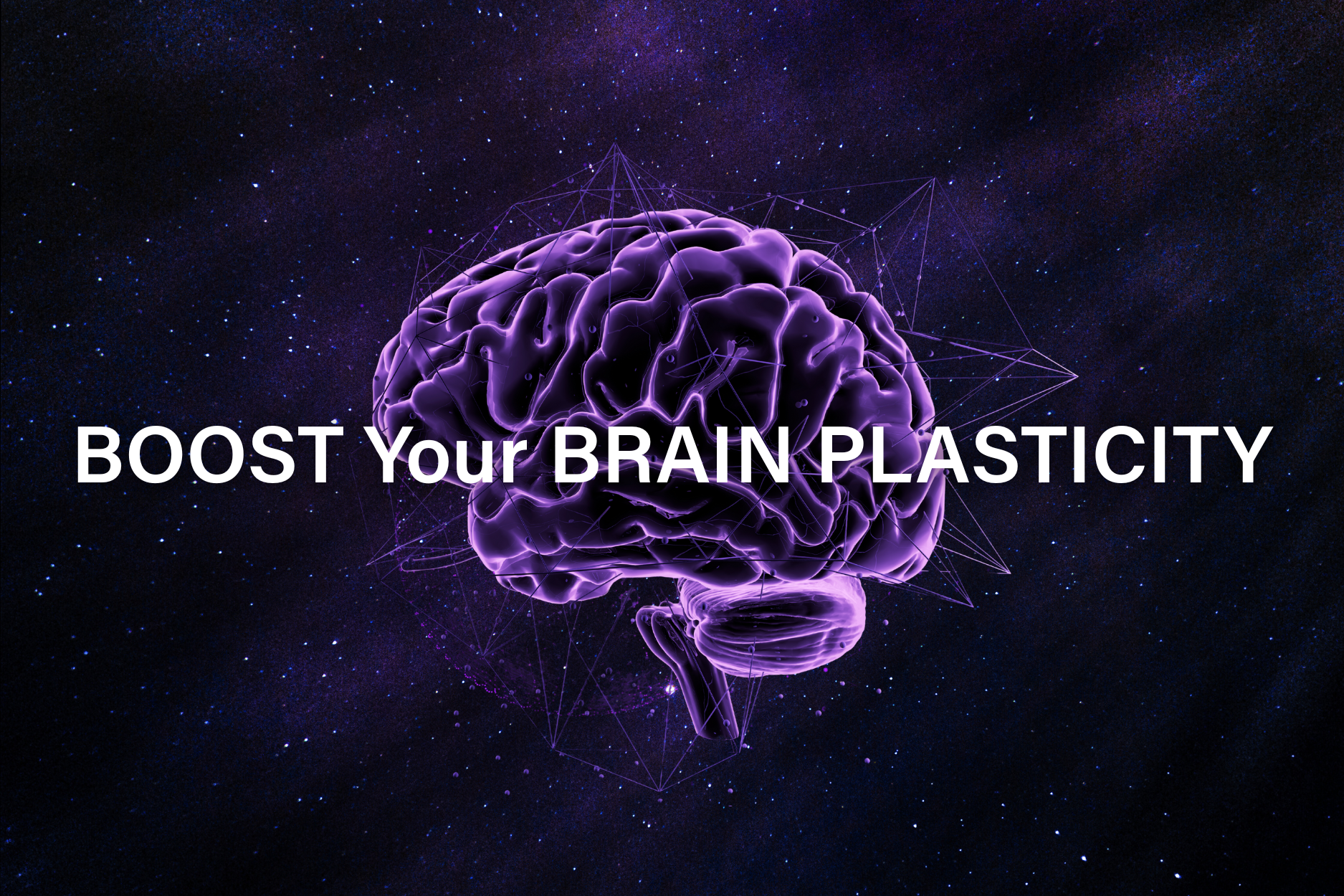
How to Boost Brain Plasticity and Become Smarter Naturally
Your Brain is Always Changing
For years, people believed that intelligence was fixed — that you were born with a certain number of brain cells, and once they died, that was it. But science now tells a very different story. Thanks to the incredible discovery of brain plasticity (or neuroplasticity), we know that the brain can rewire, repair, and grow new connections at any stage of life.[1]
This means that no matter your age, you can still learn faster, sharpen your memory, improve focus, and even become smarter. The secret lies in understanding how brain plasticity works and knowing which foods, habits, and exercises can boost it.
In this blog, we’ll explore what brain plasticity is, why it’s such a powerful concept, and practical, science-backed ways to harness it for better brain health and lifelong learning.
What is Brain Plasticity?

Brain plasticity, also called neuroplasticity, is the brain’s incredible ability to change, adapt, and form new connections throughout life. For a long time, people believed that brain development stopped after childhood, but modern research has proven that the brain is always capable of growth and renewal.
Neuroplasticity allows your brain to:
-
Generate new neurons (brain cells)
-
Strengthen or repair existing pathways
-
Build fresh neural connections to adapt to new skills, habits, or experiences
Think of your brain as a living roadmap. Every experience, thought, or activity creates a pathway. The more you repeat an activity, the stronger and more permanent that pathway becomes. This is why once you learn to ride a bike, you never really forget it—your brain has reinforced those connections over time.
The exciting part is that neuroplasticity isn’t just about learning new hobbies or improving memory. It also plays a crucial role in healing from stress, improving emotional resilience, and maintaining sharp thinking as you age. By regularly challenging your mind, supporting it with healthy nutrition, and practicing stress-reducing habits, you can strengthen your brain’s ability to adapt and thrive in everyday life.
How Does Neuroplasticity Work?
At the core of brain plasticity are neurons (the brain cells) and neural pathways (the connections between them).
Here’s how it works:
-
When you learn something new — say, how to play guitar — your brain begins creating new pathways.
-
As you practice, those connections become stronger, faster, and more efficient.
-
If you stop, they weaken, but can always be reignited with practice.
Brain plasticity also explains why recovery is possible after brain injuries. With the right stimulation, other parts of the brain can “take over” lost functions and help restore abilities.
In short, your brain is like a muscle: the more you challenge it, the stronger and more flexible it becomes.
The Benefits of Brain Plasticity

The ability of the brain to rewire itself brings enormous benefits at any age. Here are some of the most exciting outcomes of an adaptable brain:
- Learn faster and more effectively — new skills stick more quickly.
- Sharper problem-solving — finding creative solutions becomes easier.
- Better focus and concentration — distractions don’t derail you as easily.
- Enhanced social skills — conversations flow better when your brain is agile.
- Resilience after brain injury — recovery is faster when neuroplasticity is stimulated.
- Improved motivation and drive — you feel mentally energised.
- Stronger memory retention — both short- and long-term recall get a boost.
For those working in high-stress jobs or studying, improving brain plasticity can make the difference between just coping and truly thriving.
Foods and Nutrients That Boost Brain Plasticity

Your brain consumes about 20% of your body’s energy, which means what you eat directly affects how well it functions. A nutrient-dense diet fuels the brain and supports neuroplasticity.[2]
Healthy Fats: The Brain’s Best Friend
The brain is nearly 60% fat, so healthy fats are essential for brain health. Include:
- Avocados
- Nuts and seeds
- Olive oil and avocado oil
- Fatty fish (salmon, sardines, tuna)
- Coconut oil
Supplementing with omega-3 fatty acids (from fish oil or algae-based supplements) has been shown to improve memory, learning, and mood.[3]
Vitamins and Antioxidants
As we age, oxidative stress can damage brain cells. Luckily, antioxidants help protect and repair them.
- Vitamin C: Found in citrus fruits, Kakadu plum, and berries.
- Vitamin E: Found in nuts, seeds, and spinach.
- Polyphenols: Found in green tea, dark chocolate, and red grapes.
These nutrients protect brain cells, slow cognitive decline, and reduce the risk of age-related diseases.[4]
Adaptogens and Nootropics
Herbal adaptogens like Schisandra berry, Rhodiola rosea, and California poppy are widely studied for their ability to manage stress, balance mood, and support overall mental resilience. L-Theanine, naturally found in green tea, is often called the “zen nootropic” because it promotes calm focus while reducing overstimulation.
When combined with the right lifestyle choices, adaptogens and nootropics create a powerful synergy for enhancing brain plasticity. They don’t just help reduce stress, they also encourage the brain to form stronger connections, making learning and focus easier over time.[5] If you’d like to explore this further, check out our in-depth blog on the benefits of Ashwagandha[6], another adaptogen shown to support both cognitive performance and stress reduction.
Daily Habits That Improve Brain Plasticity

You don’t have to be a neuroscientist to train your brain. Simple lifestyle shifts can make a huge impact.[7]
Stress Management
Physical activity increases blood flow to the brain and boosts the production of brain-derived neurotrophic factor (BDNF), a protein essential for neuroplasticity. Aerobic exercise (like running, cycling, or swimming) is especially effective.
Sleep Well
Sleep is when the brain consolidates memories and builds connections. Adults should aim for 7–9 hours of quality sleep per night to maximise learning and focus.
Mindfulness and Meditation
Meditation has been shown to physically change brain structures linked to memory, self-awareness, and compassion. Just 10 minutes a day can stimulate new neural pathways.
Stress Management
Chronic stress floods the brain with cortisol, which can impair memory and shrink key brain areas. Incorporating stress-reducing habits like yoga, breathwork, or adaptogenic supplements helps keep neuroplasticity strong.
If you want to dive deeper into how lifestyle choices and nootropics can support a sharper mind, check out our blog on How To Be More Productive.[8]
Exercises to Rewire Your Brain

If you’re ready to challenge your mind, here are practical exercises proven to boost brain plasticity:
- Use your non-dominant hand: Brush your teeth or use the mouse with your opposite hand.
- Explore new places: Even taking a different route to work stimulates new neural connections.
- Fast occasionally: Short-term fasting can promote neuron growth and adaptive brain responses.
- Play a musical instrument: Learning guitar, piano, or drums builds new networks.
- Dance or sing: Movement and vocal training stimulate creativity and happiness.
- Learn a new language: Expands vocabulary and enhances memory.
- Play strategy games: Chess, Sudoku, or even certain video games keep the mind sharp.
- Read daily: Reading strengthens comprehension and analytical skills.
- Try a new sport: Physical learning combines motor skills with memory.
Each of these activities forces your brain to form fresh pathways or strengthen old ones, leading to faster learning and better mental resilience.
Brain Plasticity, Ageing, and Mental Health
One of the most exciting aspects of neuroplasticity is its potential to slow ageing and protect mental health. Studies show that maintaining brain plasticity reduces the risk of Alzheimer’s disease and dementia.[9]
Putting It All Together: Building a Smarter Brain
Your brain is your body’s supercomputer. When it works at its best, life feels easier, sharper, and more fulfilling. By combining:
-
Brain-nourishing foods and supplements
-
Healthy daily habits like exercise, meditation, and sleep
-
Challenging mental activities that form new connections
…you can keep your brain adaptable, strong, and endlessly capable.
If you’re ready to take brain health seriously, consider exploring the Savvy CALM Starter Nootropic Stack | For Calm and Clarity. This powerful bundle is designed to support your mind and body with a synergistic mix of adaptogens, vitamins, and antioxidants that work together to reduce stress, promote relaxation, and sharpen focus. By combining carefully chosen natural ingredients, this stack helps calm the nervous system while still supporting steady energy and mental clarity. It is not just about managing stress in the moment, it is about creating a foundation for long-term brain health, resilience, and clarity in everyday life.
TL;DR (Too Long, Didn’t Read)
Brain plasticity, also known as neuroplasticity, is your brain’s natural ability to grow, adapt, and rewire itself throughout life. This means you can boost memory, sharpen focus, and even become smarter at any age. The key is to fuel your brain with the right foods, habits, and activities.
Eating nutrient-rich foods like healthy fats, omega-3s, and antioxidants supports brain health, while adaptogens like L-Theanine and Schisandra help balance stress and enhance focus. Lifestyle habits such as exercise, meditation, quality sleep, and stress management are powerful ways to keep your brain adaptable.
On top of that, specific activities like playing an instrument, learning a new language, or exploring new places stimulate the formation of new neural pathways. This helps you stay mentally sharp and reduces the risk of age-related decline, including Alzheimer’s disease.
For those who want to support long-term brain health, combining a balanced lifestyle with natural nootropics can provide the mind with essential nutrients, adaptogens, and antioxidants. Alongside healthy habits such as regular exercise, quality sleep, and a nutrient-dense diet, nootropics play a valuable role in reducing stress, supporting memory, and improving focus. By nurturing brain plasticity, you are giving your brain the tools it needs to adapt, repair, and grow stronger over time. This not only helps protect your mental well-being but also unlocks your potential to think with greater clarity, maintain a sense of calm in daily life, and perform at your best in work, learning, or creative pursuits.
REFERENCES
[1] BRAIN PLASTICITY AND BEHAVIOR
[2] Effects of Diet on Brain Plasticity in Animal and Human Studies
[3] Omega-3 fatty acids and traumatic neurological injury
[4] Antioxidant potential of vitamins A, E and C in modulating oxidative stress in rat brain
[6] The Truth About Ashwagandha: Benefits & Science
[7] Neuroplasticity and Healthy Lifestyle
[9] Alzheimer disease and neuroplasticity
[10] Savvy CALM Starter Nootropic Stack







